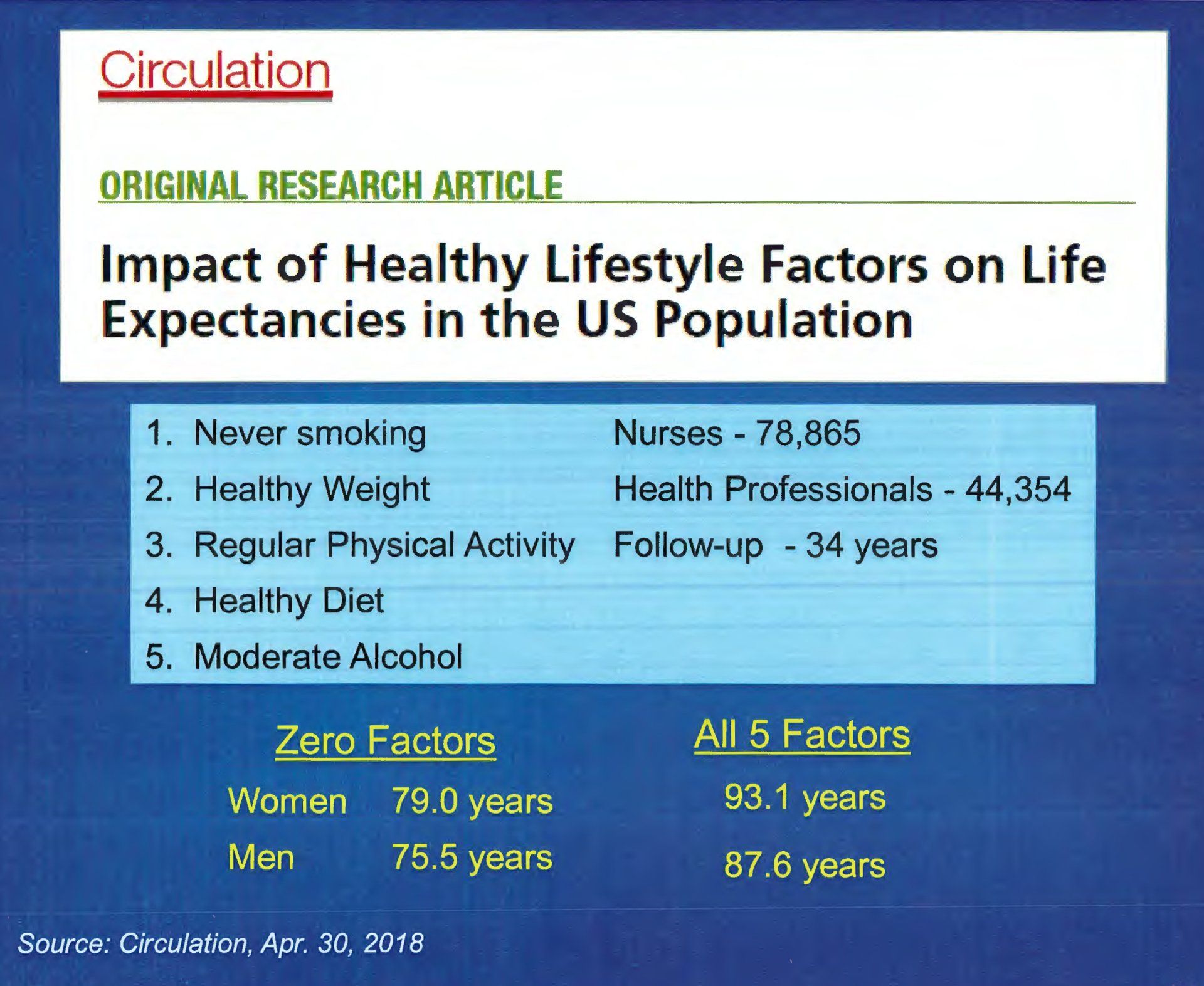PODCASTS & VIDEOS
HEALTHY LONGEVITY
Healthy Living to 100 to 120 is entirely possible. Here are some stories about those who have done so
Orville Rogers
At the age of 50, Orville Rogers picked up Ken Cooper's best-selling book Aerobics. Cooper, who had trained Air Force recruits and NASA astronauts, was the man responsible for the American fitness explosion, and now heads the world-renowned Cooper Clinic in Dallas.
Orville started running immediately and never stopped. At age 90, he began competing in USA Track and Field Masters races. For the next 11 years, he set over 15 world records in various age-graded events.
Orville was the model of better health at lower cost until he died at 102 years old.
This
is his story.
BLUE ZONE INTERVIEWS
"Blue Zones" are areas in which people have low rates of disease and live longer than elsewhere. These are recent interviews of a number of people living in Loma Linda, California, one of the five original "Blue Zones."
"Blue Zones" are areas in which people have low rates of disease and live longer than elsewhere. These are recent interviews of a number of people living in Loma Linda, California, one of the five original "Blue Zones."
These are some of the younger members of Loma Linda, California Blue Zone, one of the five original Blue Zones.
Doctors Dean and Ayesha Sherzai's shared experience of having grandparents succumb to dementia led them to "career suicide" which resulted in saving many lives.
HOW DO WE LIVE HEALTHY LONGER LIVES?
We start with some background on the invention of preventive medicine.
THE IMPORTANCE OF PREVENTIVE MEDICINE
The Man who Invented Aerobics
The person that figured out the answer to what was needed is Dr. Ken Cooper, medical doctor to the astronauts in the 1960s, who developed aerobics as a way of staying fit in space. Fifty years ago, Ken wrote the book “Aerobics” - introducing the word into the English language. At that time there were only 100,000 joggers. Fifteen years later, in the early 1980s, there were 34 million joggers. Ken Cooper, with some help from Jane Fonda’s exercise tapes, put physical fitness on the global agenda. In 1970, the government of Brazil asked Ken to train their football team (what Americans call soccer). He did and they won the World Cup that year. The Brazilians had no word for jogging so they adopted “making Cooper” in Portuguese as a way of translating the word jogging.
Impact of Health Lifestyle Factors on Life Expectancy
The program started by Dr. Cooper in 1970 has been validated in a study by the TH Chan School of Public Health at Harvard which has found that the life span in the United States for men is 87.6 years and for women 93.1 years according to research published in Circulation Magazine in April 2018 on 123,000 men and women over 34 years – see study. However, because men and women live unhealthy life styles including lack of physical activity, unhealthy diets, smoking and too much alcohol life expectancy for men is 75.5 years and for women is 79 years By adopting unhealthy life styles, men and women , the cost of healthcare has increased dramatically as six chronic diseases that virtually didn't exist 100 years ago have now become the biggest in healthcare: Dementia, Mental Illness, Cancer, obesity, Diabetes and Heart Disease.
RISK REDUCTION AND PREVENTION OF THE SIX CHRONIC DISEASES – MENTAL ILLNESS, DEMENTIA, CANCER, OBESITY DIABETES AND HEART DISEASE
LIVING WITH CHRONIC DISEASES THAT ARE KILLING US – THE BIG SIX
100 years ago, the main causes of death were pneumonia and tuberculosis. However, today, we have six chronic diseases: Dementia, Mental Illness, Cancer, Obesity, Diabetes and Heart Disease which are largely the result of unhealthy lifestyles.
100 years ago, the main causes of death were pneumonia and tuberculosis. However, today, we have six chronic diseases: Dementia, Mental Illness, Cancer, Obesity, Diabetes and Heart Disease which are largely the result of unhealthy lifestyles.
Preventive Medicine has become the future of medicine because it addresses the chronic disease today - Alzheimer’s, Cancer, Diabetes, Obesity and Heat Disease - which are all phenomenas of the last 100 years in developed countries moving to developing countries and virtually non-existent in underdeveloped countries. Chronic diseases today are exploding our healthcare costs. We have no choice, but to get chronic diseases under control.
We need to get the word out globally that one third to up to one half of Alzheimer’s and one third to up to one half of Cancer is preventable or at least can be postponed. Diabetes, Obesity and Heart Disease can also be reduced. But we need to sound a wake-up call with the scientific evidence that exists.
Here is a recent radio interview of Chuck Stetson, Stetson Family Office on the importance of Preventive Medicine.
MENTAL ILLNESS
Many teenagers struggle with mental health issues like depression – nearly 15% of girls and 8% of boys. Teen depression can lead to bigger problems with their physical health such as type 2 diabetes, metabolic syndrome or obesity that can carry on into adulthood. It can also impact their psychological well-being in the form of low self-esteem or suicidal thoughts. Academic performance often suffers as well, which can reinforce negative feelings of self-worth.
Adolescents with depression are often limited in their ability to perform basic life functions and frequently report being in distress. Depression is debilitating and associated with negative health-related outcomes, so finding methods to prevent it in teenagers is of utmost importance.
In a recent study, researchers from the University of North Texas and the University of Wisconsin-Milwaukee examined the relationship between cardiorespiratory fitness, body mass index, and depressive symptoms among young adolescents.
Nearly one-third of the students were identified as at-risk for depression. Looking even deeper, the results showed that those who were not in the Healthy Fitness Zone for CRF were significantly more likely to have elevated depression symptoms. Students in the Needs Improvement category for low CRF were 71% more likely to show symptoms of depression.
More specifically, girls in the Needs Improvement zone were 63% more likely to have elevated depression compared to the girls in the Healthy Fitness Zone. Boys in the Needs Improvement zone were over two times more likely to have elevated depression compared to the boys in the Healthy Fitness Zone. However, BMI was not significantly associated with the depression score in this sample of young adolescents.
Dig deeper
DEMENTIA
ABOUT 90 PERCENT OF DEMENTIA IS ALZHEIMER’S DISEASE WHICH APPROXIMATELY 5.8 MILLION AMERICANS HAVE.
Alzheimer’s Webinar
Listen and watch why researchers believe that from a third to up to one half of
all Alzheimer’s can be postponed, reduced or avoided.
This global webinar, from early 2019, was sponsored by Alzheimer’s Disease International (ADI) and the Stetson Family Office.
Dig deeper on the research
- Two Lancet Commission articles from December 2017 confirming that 1/3 of the population can reduce the incidence of Alzheimer's Disease through cardiovascular exercise. (Dementia and Prevention)
- The research on the 20,000 Cooper Clinic patients that had 38 percent less incidence of Alzheimer's Disease
- The FINGER study in Finland, the gold standard worldwide in determining the impact of cardiovascular, nutrition and cognitive training in reducing cognitive decline.
- The UN World Health Organization on May 15, 2019 released the Following Risk Reduction Of Cognitive Decline and Dementia at the Royal Palace in Stockholm, Sweden.
- The WHO Guidelines on Dementia, they will go a long way in informing the public on simple steps towards Better Health.
Here’s the Press Release.
Please find more information on Preventing Alzheimer’s Disease below…
Healthy Heart Means a Healthy Brain?
Signs of Alzheimer's
Memory loss that disrupts daily life may be a symptom of Alzheimer's or another dementia. If you notice any of the warning signs in yourself or someone you know, please see your doctor.
THE ALZHEIMER’S ASSOCIATION HAS THE FOLLOWING INFORMATION ON UNDERSTANDING ALZHEIMER’S.
Alzheimer's is the most common form of dementia. It causes problems with memory, thinking and behavior.
HERE ARE SOME OF THE STORIES ABOUT THE IMPACT OF ALZHEIMER’S:
Meryl Comer - A Caregiver’s Account of Alzheimer’s.
A woman is like a teabag. You never know how strong she is until she's in hot water.
Meryl is President and CEO of Geoffrey Beene Foundation Alzheimer's Initiative, which promotes early diagnosis, virtual innovation challenges, m-health technologies and national public service campaigns. She is a Co-Founder of WomenAgainstAlzheimer's and Founding Partner of the Global Alliance on Women's Brain Health. Meryl is also Co-Principal Investigator for the PCORI Alzheimer's, Dementia, Patient & Caregiver Powered Research Network (funded by PCORI), a partnership of the Mayo Clinic, UCSF Brain Health Registry and UsAgainstAlzheimer's. She is a veteran broadcast journalist. Her New York Times
bestseller, Slow Dancing with a Stranger: Lost and Found in the Age of Alzheimer's
(HarperCollins) is an unflinching account of her husband’s early onset Alzheimer’s disease and a “much-needed wake-up call for an honest dialogue about this fatal neurodegenerative disease.” All of the proceeds support Alzheimer's research.
Hear Todd Stump's story and what it was like to care for his mother with Alzheimer's.
Dementia X Forum, May 15, 2019 at the at The Royal Palace of Sweden. In the picture from left to right: George Vradenburg, Miia Kivipelto, Queen Silvia and Chuck Stetson.
The UN World Health Organization on May 15, 2019 released the Following Risk Reduction Of Cognitive Decline and Dementia at the Royal Palace in Stockholm, Sweden.
The WHO Guidelines on Dementia, they will go a long way in informing the public on simple steps towards Better Health.
The WHO Guidelines on Dementia, they will go a long way in informing the public on simple steps towards Better Health.
Here’s the Press Release.
CANCER
Preventing Cancer
According to M.D. Anderson Cancer Center, one third to one half in aggregate of all the 100 or so identified cancers are preventable. This series tells stories of people that were able to prevent cancer by early detection.
According to M.D. Anderson Cancer Center, one third to one half in aggregate of all the 100 or so identified cancers are preventable. This series tells stories of people that were able to prevent cancer by early detection.
He Couldn't Have Known...That His Investment Would Save His Mother-In-Law's Life
Dig deeper on the research
Treating Cancer
Loma Linda University Health has sought to not see patients as customers, but as individuals, through a focus on whole person care. Their patients even call their treatment a "Radiation Vacation."
OBESITY
The Obesity Epidemic
Weight Loss of the Nation is a three part HBO film about the Obesity epidemic which discusses consequences, choices and children. As the film points out, we have to each take a disciplined approach to healthy weight. Even if we are part of the 67 percent of Americans that are overweight or obese, we can start doing the following:
How Young People Can Get Better Grades and Avoid Obesity Through Exercise.
Dig deeper on the research
Adverse Childhood Experience
Dig deeper on the research
DIABETES
Dig deeper on the research
HEART DISEASE
Is it a lack of knowledge? The Health Zone School Program deals with the issue of knowledge. Is there something deeper? One of the issues the Obesity Clinic of Kaiser Permanente Hospital in San Diego found is that abused children eat a lot of comfort food and become obese. They know that they should eat a better diet. However, the need for comfort overrides this.
Preventing Heart Disease
Dig deeper on the research
- Association of Midlife Cardiorespiratory Fitness with incident depression and cardiovasular death after depression in later life.
- Cooper Institute Study: Low level of fitness has increased risk of depression
- Association Between Push-up Exercise Capacity and Future Cardiovascular Events Among Active Adult Men


